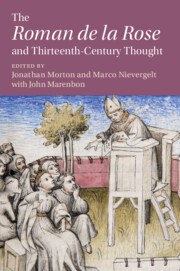Book contents
- The Roman de la Rose and Thirteenth-Century Thought
- Cambridge Studies in Medieval Literature
- The Roman de la Rose and Thirteenth-Century Thought
- Copyright page
- Contents
- Contributors
- Acknowledgements
- Note on Primary Texts
- Introduction
- Part I Epistemology and Language
- Part II Natural Law, Politics, and Society
- Part III Unfinished Business
- Chapter 8 Jean de Meun, Boethius, and Thirteenth-Century Philosophy
- Chapter 9 The Romance of the Non-Rose
- Chapter 10 Metalepsis and Allegory
- Notes
- Bibliography
- Index
- Cambridge Studies in Medieval Literature
Chapter 8 - Jean de Meun, Boethius, and Thirteenth-Century Philosophy
from Part III - Unfinished Business
Published online by Cambridge University Press: 17 June 2020
- The Roman de la Rose and Thirteenth-Century Thought
- Cambridge Studies in Medieval Literature
- The Roman de la Rose and Thirteenth-Century Thought
- Copyright page
- Contents
- Contributors
- Acknowledgements
- Note on Primary Texts
- Introduction
- Part I Epistemology and Language
- Part II Natural Law, Politics, and Society
- Part III Unfinished Business
- Chapter 8 Jean de Meun, Boethius, and Thirteenth-Century Philosophy
- Chapter 9 The Romance of the Non-Rose
- Chapter 10 Metalepsis and Allegory
- Notes
- Bibliography
- Index
- Cambridge Studies in Medieval Literature
Summary
Boethius’s Consolation of Philosophy was one of the philosophical works best known to Jean de Meun, and later in life, after he had written his part of the Roman de la Rose, he would translate it into French. The Consolation is not, however, a straightforward philosophical treatise, but a work that uses a variety of literary forms (dialogue; the alternation of prose and verse; personification) in order, arguably, to convey a much more complex position than the ostensible conclusion of the argument made by Lady Philosophy. This complexity is due especially to Boethius’s reaction to what I call ‘the Problem of Paganism’. Although the Consolation was widely read, closely studied and imitated or used in a whole variety of ways from the ninth century onwards, most of its medieval readers were not sensitive to these complexities. This contribution will investigate whether the Roman de la Rose shows that Jean de Meun is an exception to the rule. It will do so by looking at the relation between his part of the poem, the Consolation and the Problem of Paganism.
- Type
- Chapter
- Information
- The ‘Roman de la Rose' and Thirteenth-Century Thought , pp. 173 - 193Publisher: Cambridge University PressPrint publication year: 2020

